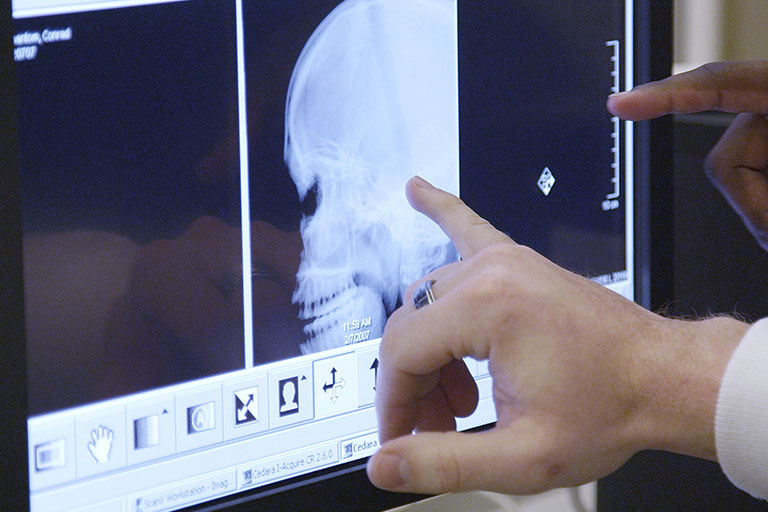What is Radiography?
A radiographer is like a photographer. A photographer that uses ionizing radiation instead of a camera. Ionizing radiation includes gamma rays, X-rays, and higher energy ultraviolet. Radiographers use special equipment that make images for medical purposes. Doctors then use those images to diagnose and treat their patients.
Radiography is both an art and a science. You’ll use radiation to provide images of the human body, its tissues, organs, bones, and vessels. These images may be on film or displayed in real time on a video screen. Radiologists (physicians who have had special training in interpreting x-ray images) read/diagnose these images. Treatment of patients depend on the accurate and precise production of radiographic examinations.
Rad techs perform exams both in a radiology department and bedside by using a portable x-ray machine. Chest and abdomen X-rays, X-rays to rule out fractures, and we work with Radiologists to do exam with live X-ray (fluoroscopy) such as Upper GI’s, esophagrams, Lower GI’s. We operate a live x ray machine called a C-Arm in some surgery cases (mainly ortho, but a few others as well).
Not everyone is a textbook patient. Most are not that you will encounter in a hospital. Rad techs are constantly figuring out ways to adapt to the patient. Are they immobile? Is there arm fractured so we must get our views differently because we cannot move the hurt part? Are they a scared crying child that we need to get X-rays of? Radiography requires problem solving and critical thinking on an almost daily basis, so there’s never a dull moment! That’s also why there is such a large element of clinical time/learning. In order to graduate and be a competent tech, the students need clinical time to actually work with patients and other techs to learn hands on how to cope with all the different variables that we see on a day-to-day basis in the hospital.
The radiographer IS an essential member of the health care team.
What are my career choices?
A radiographer can work in hospitals, health clinics, doctor’s offices, outpatient clinics, research laboratories, and industrial firms. A career in radiography can lead in many different directions. Rad techs are needed in every health care setting. You can work in a large hospital, an outpatient clinic, urgent care, or a doctor’s office. Within a hospital setting you will be able to work with inpatients, outpatients, the emergency room, and the operating rooms. With additional education and/or certification, you can become trained in bone densitometry, cardiac-interventional radiography, mammography, CT, MRI, radiation therapy, or a registered radiology assistant.
How long is the program?
The program is 2 years, 5 semesters (one 6-week summer semester of 4 days a week clinicals) and requires 3 full 8 hours days a week the first year (1 day classroom instruction, 2 days clinical), and 4 full 8 hours days the second year (1 day classroom instruction, 3 days clinical).
(Must be completed prior to taking IMG 100), and Must have earned a C or better
- BIO 137 Human Anatomy & Physiology I, 4 credits
- BIO 139 Human Anatomy & Physiology II, 4 credits
- MAT 150 College Algebra, 3 credits
(General education courses can be completed while active in the Radiography Program)
- AHS 115 Medical Terminology, AHS 120 Medical Terminology, or CLA 131 Medical Terminology from Greek and Latin, 1-3 credits
- ENG 101 Writing I, 3 credits
- PHY 152 Intro to Physics, PHY 171 Applied Physics, or PHY 172 Physics for Health Sciences, 3-4 credits
- Social/Behavioral Sciences*, 3 credits
- Heritage/Humanities*, 3 credits
- SUBTOTAL: 23-27 credits
FIELD LICENSURE REQUIREMENTS
In addition to completing the program, students must pass the American Registry for Radiologic Technologists national certification exam to become registered. State licensure is required in some states.
Some travel will be required to out-of-town clinical sites in order to provide the student a well-rounded clinical experience.
This program has been granted SACSCOC Approval.
Program Application
Deadline to apply is May 1st. We take a new class of 7 every year, starting in the Fall. In addition to the application and the prerequisites, applicants must do a 4-hour observation in a Radiology department and must watch the preadmission conference video on the program’s webpage. This is a selective admission program, students are scored based on grades/GPA, and if they currently hold a license in another allied health or nursing profession.
- Radiography Program Application
- Selective Admissions Score Sheet
- Program Requirements for Application
What are my degree, diploma, or certificate options?
Degrees and Transfers
Advising Conference
4-Hour Observation Details
Please attend a 4-Hour Observation in the Radiography Department at King’s Daughters Medical Center.
Please contact Ruth Huffman for completion of the Job Shadowing packet, plus submit a recent TB skin test, proof of COVID vaccination, and proof of influenza vaccination if we are still in flu season to :
Ruth Huffman, MSN, RN King’s Daughters Medical Center Clinical Educator & School Liaison 606-408-0110 Ruth.Huffman@kdmc.kdhs.usProgram Specifics
Radiography Program Mission
Consistent with the vision and mission statements of ACTC, the Radiography Program will be a leader in workforce development by providing a quality education in the field of Radiologic Technology. The program will utilize a competency-based evaluation system to prepare graduates with the necessary skills to administer the production of high-quality medical imaging. Faculty emphasizes critical thinking, effective communication and encourages students to continue their professional development after graduation. A variety of clinical environments along with instruction in the classroom and laboratory, will provide program participants with a well-rounded educational experience.
Radiography Program Values
- Intellectual, professional, and personal growth of students’ faculty and staff
- Excellence in teaching, advising, and supporting students
- Student success through individualized attention
- Climate of mutual respect and collaboration
- Interactive and adaptive relationship with the radiography community
- Lifelong learning
- Cultural diversity and human dignity
- Continuous improvement of the program
Radiography Program Goals and Student Outcomes
- Students/Graduates will demonstrate clinical competence.
- Students will utilize proper radiation protection practices.
- Students will provide appropriate speed when performing radiographic images.
- Students will properly position for radiographic procedures.
- Students will utilize and demonstrate appropriate technical factors for procedures.
- Students/Graduates will demonstrate effective communication skills with patients and
health care workers.
- Students can demonstrate effective communication skills to patients (bedside manner).
- Students can work alongside other healthcare professionals efficiently and effectively.
- Students/Graduates will demonstrate the critical thinking skills needed in the Radiography
profession.
- Students will demonstrate appropriate measures to correct inadequate images.
- Students will critique images for positioning precision.
- Students will identify different pathologies and recognize what technical adjustments need to be made.
- Students will display appropriate critical thinking and problem-solving skills during trauma procedures.
- Students/Graduates will grow and develop professionalism.
- Students will be involved with and understand professional growth.
- Students will exhibit professionalism in the clinical setting.
Radiography Program Effectiveness Data
Program Effectiveness will be posted once the first class has completed the program.




